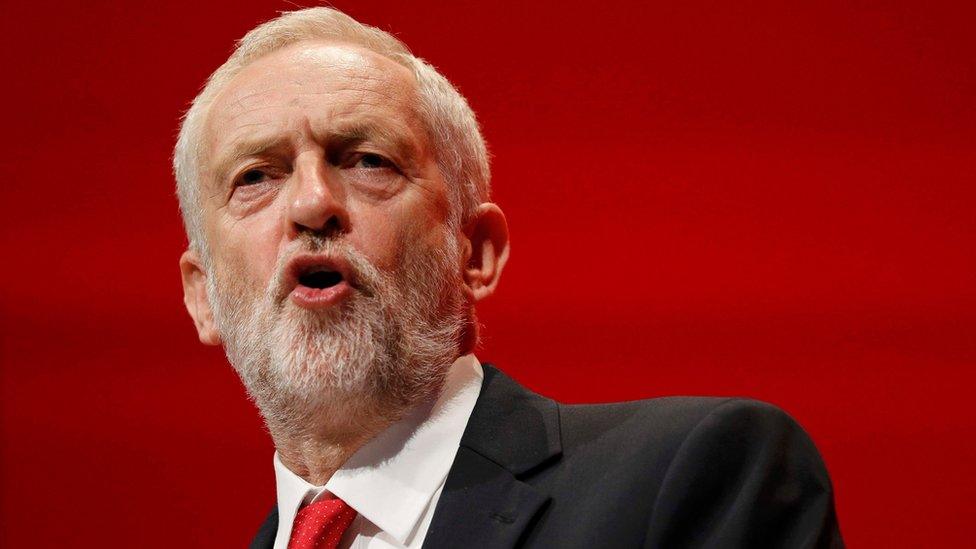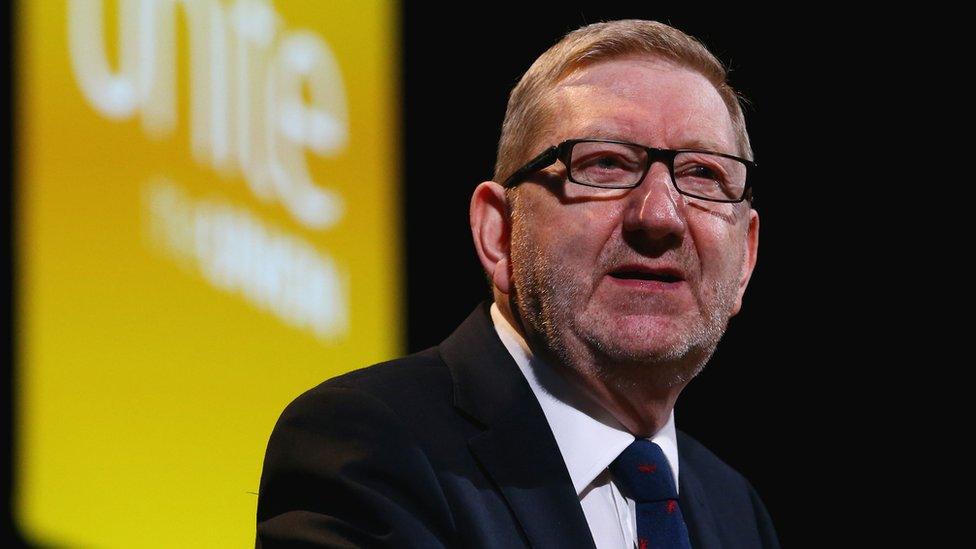Labour too weak to win election alone, Fabian Society says
- Published
- comments

The left-leaning Fabian Society called Labour's approach to Brexit "muffled and inconsistent"
Labour is "too weak" to win a general election alone and should consider working with rival parties, a left-of-centre think tank has said in a report.
Andrew Harrop, the Fabian Society's general secretary, said there had been a "huge meltdown" of support in Scotland.
His study, external also cited party leader Jeremy Corbyn's unpopularity and a "muffled" approach to Brexit.
But Mr Corbyn's spokesman said he was an alternative to "failed" UK politics.
And shadow housing minister John Healey said teaming up with a "rag-bag of other parties" was "not the answer to Labour's challenge".
'Terrifying thought'
The Fabian Society, which has close links to the party, warned it was on course to win fewer than 200 seats for the first time since 1935. It currently has 231.
Based on current opinion polls, the total could fall as low as 140 because Labour traditionally does worse than its mid-term polling suggests, the report added.
Mr Harrop told BBC Radio 4's Today Programme this was a "pretty terrifying thought" for most Labour supporters.
"The 2015 election led to a huge meltdown in Scottish support and the rise of the SNP and that's stopping Labour making progress," he said.

Unite general secretary Len McCluskey has suggested Mr Corbyn could step down before the next general election
The Fabians said Labour could gain 30 seats by aligning with centre-left parties at the next election.
"The Corbynite Left has won the big internal battles but it seems to have no roadmap for winning back lost voters," the report said.
The Fabians said Labour also faced a "Brexit dilemma" because it had failed to gain the support of Leave voters, and it would not win "if it doesn't reach out to the many people who voted to leave the European Union".

Analysis - by Iain Watson, BBC political correspondent
The Fabians have rather stated the obvious - based on current polls, Labour is in deep electoral difficulty.
And it has the tricky task of trying to appeal to both Remain and Leave voters - while its message remains "muffled".
Some of the Fabians' potential solutions to Labour's problems, though, might simply compound their difficulties.
They say that, as the party can't possibly hope to win the next election on its own, its MPs will have to work with other "progressive" forces, such as the SNP and Greens.
Cast your mind back to 2015 and remember the difficulties Ed Miliband had trying to persuade voters in English marginal seats that the SNP tail wouldn't wag the Labour dog. The Fabians' approach would at least make a virtue of necessity and end any ambiguity.
But Leave voters in what are currently Labour seats might not warm to the message that Jeremy Corbyn would work closely with a party that will vote against triggering Article 50.
The Labour leader prefers to think he will win back lost support by catching the anti-establishment zeitgeist. Many of his supporters don't believe the polls.
Well, Mr Corbyn's strategy will be tested in front of real voters early this year at the Copeland by-election - a seat Labour has held since its creation in 1983.
Current MP Jamie Reed is standing down at the end of the month and the party's elections chief Jon Trickett is predicting a "difficult" contest.
If Labour fares badly, that is likely to underline the strength of the Fabians' diagnosis - but the cure for the party's problems may continue to be elusive.

The report said the Conservatives and Liberal Democrats could afford to attract "one side only" but that Labour needed support from both camps.
"On Brexit, the greatest political question for two generations, the party's position is muffled and inconsistent," it said.
In marginal seats, it warned that Labour supporters could "scatter in all directions".
It urged the party to represent the "cultural middle", saying Britain was "not a polarised nation of cosmopolitans and reactionaries". But it said the threat Labour faces from UKIP was "exaggerated".
Mr Corbyn's spokesman said it would be a "challenge" to rebuild Labour support after the 2015 election, when it lost 25 parliamentary seats and was reduced to just one MP in Scotland.
He added: "Labour under Jeremy Corbyn will be taking its case to every part of Britain in the coming months with a radical policy platform."
Mr Corbyn was the "only genuine alternative to a failed parliament political establishment and the fake anti-elitists of the hard right", the spokesman said.
And Mr Healey told Today: "These are big challenges for Labour but I do not see the answer to Labour's challenge as being to team up with the Liberal Democrats, the Greens and a rag-bag of other parties."
On Sunday, one of Mr Corbyn's allies, Unite boss Len McCluskey, suggested the Labour leader could step down if the party's poll ratings fail to improve.
But he later tweeted, external his "full support", describing Mr Corbyn as a "genuine, decent man fighting for a fairer Britain".